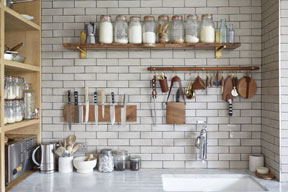
 7 clever kitchen spring clean hacks—so easy, you wish you’d done them sooner
7 clever kitchen spring clean hacks—so easy, you wish you’d done them sooner
By Susan Holtham
Kitchen lovers, it’s that time of year again. Spend less time thinking about heavy duty deep-cleaning and more time enjoying the fruits of your low-labor efforts. Get ready to savor the spotless happy place that will be your kitchen after these cost-effective, all-natural tips.
- Put a bit of vinegar on it
Clean up your stainless steel by spraying vinegar mixed with equal parts of water. It’ll wipe out greasy surfaces, fingerprints and reduce lime scale in no time, leaving you with shiny taps and mirrors. Vinegar is acidic so it’s perfect to use anywhere where you want to get rid of smears and stains. Just don’t reach for the balsamic—distilled white vinegar is what you want for the job. The same goes for getting rid of the damp smell on clothes from your washing machine. With no clothes in the machine, pour half a mug of white vinegar in where the fabric conditioner goes, put it on a run at 90°C and follow up with a rinse.
- Cake burned pots in bicarb
Sodium bicarbonate is a mild alkali and that can cause dirt and grease to dissolve easily in water. Save burned pots by covering the offending area with a thick layer of bicarbonate of soda and leaving it overnight and the brown bits will wipe off. Use a scourer if there’s still a bit of resistance. For the inside of pans, try adding some water to the bicarb, then heating the pan with the solution in it briefly first and leave it for 24 hours to really get things going. Whilst suitable for stainless steel, cast-iron and non-stick pans, don’t do this on aluminum. For those pans you can remove water tide marks by boiling water with sliced apple, rhubarb or lemon peel. For tough stains, boil three parts vinegar to one part water.
- Instead of oven cleaner…
Reach for the bicarb (again) to degrease the interior of your oven. Not only will you avoid harsh chemicals, but you’ll also resist the need to invest in a biohazard suit to clean your oven. Spread a paste of bicarb and water all over the inside surfaces of your oven, being careful to avoid the heating elements. Leave it overnight and wipe it all off with a damp cloth. You’ll probably need to give it a little elbow grease (grease + grease = no grease, right?), and spray some white vinegar onto any soda residues. This will get it to gently foam up and make it easy to wipe away anything left.
- Put a cloth on pesky high surfaces
Baffled by how the top of the fridge get so dusty? Even more baffled by how to clean it? With any awkward-to-get-to high surface, lay a sheet or piece of cloth over the surface over it and when it comes to cleaning time, just carefully re-move it, give it a shake outside and a wash. Gone are the perilous days of scrubbing an area that you can’t really see properly, and no one else will ever see, making the whole escapade feel like a total waste of time…
- Fall in love with jars
Storing store cupboard goodies such as rice, quinoa, beans, lentils and barley needn’t be a matter of shoving bags into an already jam-packed giant Tupperware. Show off your staples by investing in some big jars and artfully displaying them on a shelf. No, this is not just a thing for other people with fancy kitchens and a design degree, it’s so easy (and pretty) that once you do it, you’ll wonder why you hadn’t done so sooner. Not only will it highlight on a daily basis what you’ve got in your larder (long lost forgotten pack of chickpea flour anyone?), it’ll urge you to actually use it. Pop a label on with the date and basic cooking instructions and remember to do a little stock rotation, i.e. decant what’s already in there first before adding the new stuff.
- Throw away chipped crockery
Unless you have a real attachment to something—we’re talking about the one mug that got you through uni finals kind of attachment—get rid of any chipped crockery. They’re the double dodgy whammy of being a breeding ground for unwanted bacteria and a weak point that could lead to breakage mid-slurp. Sort through your cupboards and remove them from your kitchen (or make into a candle holder if that tickles). Go on, you can do it.
- If you haven’t use it for a year, dump it
Old spices that take up 90% of your cupboard (the other 10% being your trusty daily use table and sea salt, pepper and old pal chili flakes at the front) will lose their flavor over time. If you bought a mega pack an exotic spice whilst on holiday in India in 2006 and it’s still there, taking up space and reminding you of unrealized Keralan home-cooking dreams, now’s the time to bin it. Same goes for old mystery meats, stews and bread in your freezer. Sounds tough, but if you haven’t used it up by now, chances are you never will. And that’s okay. It can’t judge you anymore after you’ve removed it from the vicinity. Invite some friends round for a big leftover cook-off and make a note to a) actually get through the bits in your cupboard and freezer in good time b) invite people round more to help you out! Or, give the food you don’t want a new home with the Olio app.
Take a lazy afternoon to give these ago. Once you’ve whipped through them, pour yourself a much deserved [remove where appropriate] cup of tea / coffee / negroni.
Replenish your cupboards with all new spices, seasonings, grains and dream-cleaner bicarb at www.farmdrop.com.


Be the first to comment